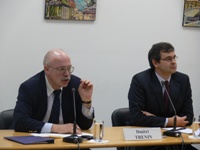Registration
You will receive an email confirming your registration.
IMGXYZ3016IMGZYXIn recent years, Turkey’s foreign policy has undergone a fundamental transformation and the country has begun to play a more aggressive and assertive role. Carnegie Europe’s Sinan Ülgen discussed the changes that have allowed this new foreign policy to take shape, as well as the implications of Turkey’s new role for the United States, the European Union, and Russia. Carnegie’s Dmitri Trenin moderated.
Turkey’s Political Transformation
Ülgen identified three drivers at the root of the transformation in Turkish foreign policy:
- Reconceptualization of Turkish identity: Ülgen explained that, for many years, the well-defined objective of Turkish foreign policy was to become fully integrated with the West. However, a shift in understanding of Turkish identity has caused that goal to change. Turkey now views itself as a country with many identities, only one of which is a Western identity.
- Desecuritization of Turkish foreign policy: Previously, a chief objective of Turkish foreign policy was to ensure the country’s national security and territorial integrity. Turkey’s foreign policy now has a much wider focus, as its diplomats are seek to develop greater economic prosperity, investments, and trade with other countries, and work to increase Turkey’s soft power.
- Economic diversification: The growth and diversification of Turkey’s economy has also helped drive its new foreign policy approach. Ülgen explained this has led to the emergence of a political constituency in Turkey that is interested in export markets. As a result, the government is under pressure to establish stable diplomatic ties with other countries, tap external markets, and boost Turkey’s exports. According to Ülgen, this economy-driven policy has become a defining feature of modern-day Turkish diplomacy.
Effect on Relations with Other Countries
Turkey’s new approach has changed its relationship with its neighbors and the EU, Ülgen said.
- Stronger relations with Turkey’s neighbors: Because of Turkey’s new approach, policy makers are working to establish stronger relations with a number of Turkey’s neighbors, such as Iran, Russia, and Syria.
- Growing frustration with Europe: Turkey’s more active and assertive foreign policy is accompanied by an increased frustration with Europe among policy makers and the population as a whole, due to Europe’s continued refusal to admit Turkey to the EU. Therefore, while the objective of joining the EU remains an important one, the momentum behind that goal has disappeared, Ülgen explained. Instead, the focus has shifted to shaping Turkey into a regional power that can act independently.
The New Turkish Foreign Policy
Ülgen argued that the transformation in Turkey’s foreign policy is a structural phenomenon, and that its assertiveness, ambition, and multi-lateral thinking are here to stay. According to Ülgen, Turkey’s good economic prospects will allow it to continue to employ a more ambitious foreign policy. The new policy is also very popular among the Turkish population. The idea of Turkey as a regional power appeals much more to people than the goal of being a member of the Western club of nations.
The Future of Turkey’s Foreign Policy
Ülgen explained that the power asymmetry between Turkey and the EU is in the process of being eradicated, and Turkey will begin to see itself as on equal footing with the EU. If that occurs, he warned that it will become increasingly difficult for the EU to deal with this more assertive Turkey. The power relationship between Turkey and the United States has also changed; the dialogue between Ankara and Washington will become more of a conversation between equals in areas where U.S. and Turkish interests overlap. Turkey is also improving its relationship with Russia, aided by the countries’ parallel policies on the Black Sea and the Middle East, he added.
